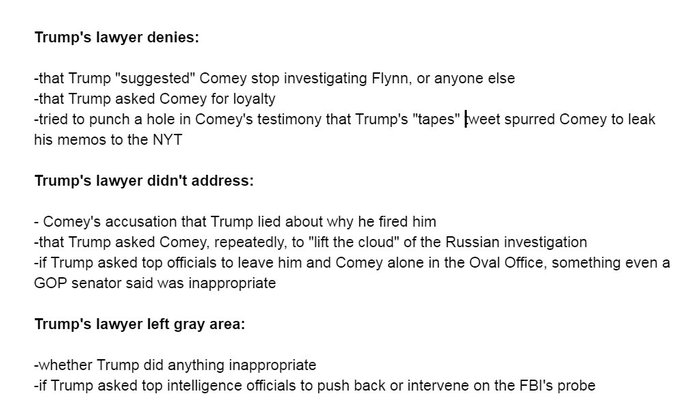The following article by Amber Phillips was posted on the Washington Post website June 9, 2017:
Update: President Trump gave the same maybe-I-did, maybe-I-didn’t statement in a press conference Friday. When asked by ABC’s Jonathan Karl whether he told Comey to back off the Flynn investigation, Trump said: “I didn’t say that. I will tell you I didn’t say that. And there’d be nothing wrong if I did say that, according to everything I read today.” The original post about why this doesn’t make sense follows.
The president is tweeting, and perhaps tweeting himself into more trouble, about James B. Comey, the FBI director he fired in May.
In his second tweet before lunchtime Friday, President Trump potentially undermined his private lawyer’s statements denying key parts of Comey’s testimony before the Senate Intelligence Committee the day before.
Here’s the tweet:
And here’s what Trump’s private lawyer for all things Russia, Marc Kasowitz, said less than 24 hours ago:
In the Fox News article Trump retweeted, Harvard Law professor emeritus Alan Dershowitz argued that the president didn’t obstruct justice in speaking with Comey about “letting go” of the FBI investigation into fired national security adviser Michael Flynn.
Dershowitz said it’s the president’s prerogative to stop the FBI’s various investigations. (That’s one legal expert’s opinion; the final decision will ultimately fall on special counsel Robert Mueller III.)
Trump just tweeted an argument of why it would be okay if he did tell Comey to back off the Flynn investigation. Is the president tacitly acknowledging that he did tell Comey to do that?
Trump appears to be using two parallel arguments: I didn’t tell Comey to back off Flynn. Or maybe I did — and that would be okay, too.
Both cannot be true. Trump either talked to Comey about Flynn (whether it was in a way that made Comey feel he was being directed by the president to drop the FBI investigation is another matter). Or he didn’t.
This is actually a pattern for Trump. He often muddies the waters on negative news stories about him in a way that gives him mutually exclusive avenues of defense. Just a few examples off the top off my head:
On Jared Kushner:
When The Washington Post reported that Russia-to-Russia communications claimed that presidential adviser and son-in-law Jared Kushner tried to set up a back channel with the Russians, White House aides went on TV immediately to defend Kushner.
The next day, Trump tweeted a Fox News article (yet another pattern) that reported Kushner did not attempt to create such a back channel. Trump later deleted the tweet, according to FactBase, which archives his tweets and other communications.
On the firing of Comey
When Trump suddenly fired Comey in May, his administration — including Vice President Pence — said it was because of the way the FBI chief had handled the investigation into Hillary Clinton’s emails. But then Trump went on TV and said: Nah, it was because of this “Russia thing.”
On the travel ban
Trump’s White House asked the Supreme Court to reinstate its much-maligned travel ban. Then Trump proceeded to completely undermine his team’s legal case for the ban in four tweets.
Trump, to put it mildly, is really, really bad at staying on his administration’s message. When he’s on the defensive, he’s really, really good at confusing that message — to the point where voters can kind of choose their own adventure about what to believe.
The problem is that, to have it both ways, Trump sometimes ends up admitting things he probably didn’t want to. And, thanks to his rush to defend himself, it’s now fair to ask whether the president is acknowledging that he told Comey to back off Flynn, 24 hours after Trump’s lawyer denied it.
View the post here.







